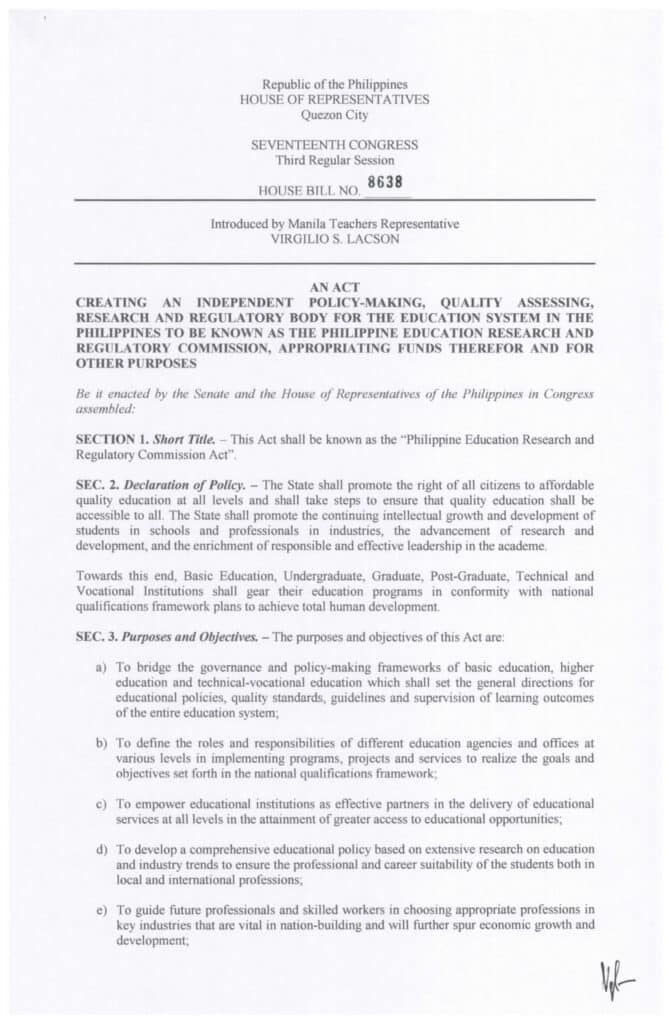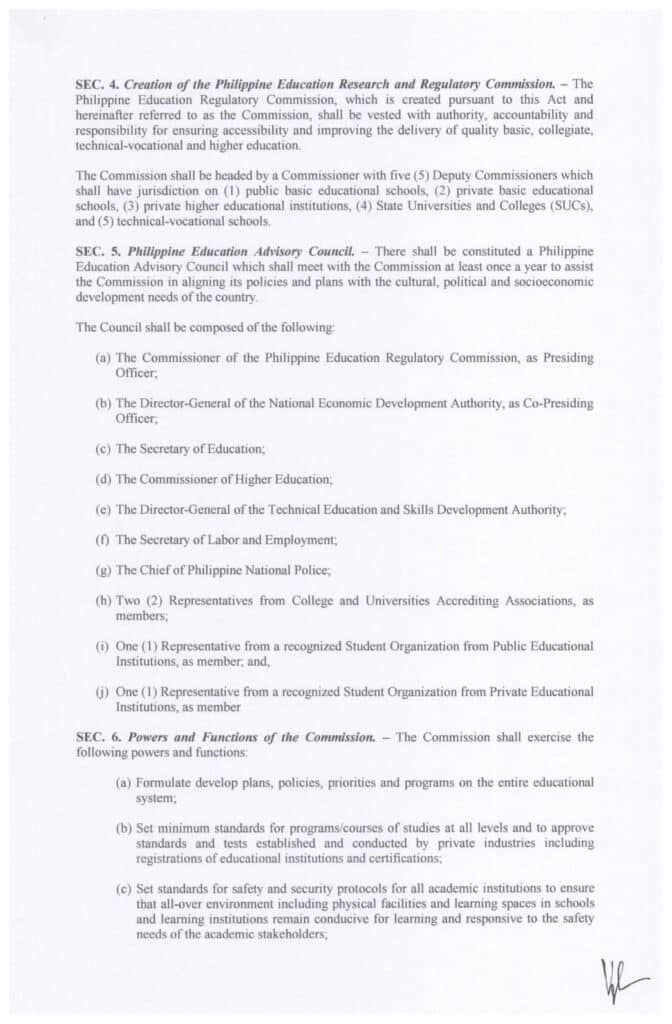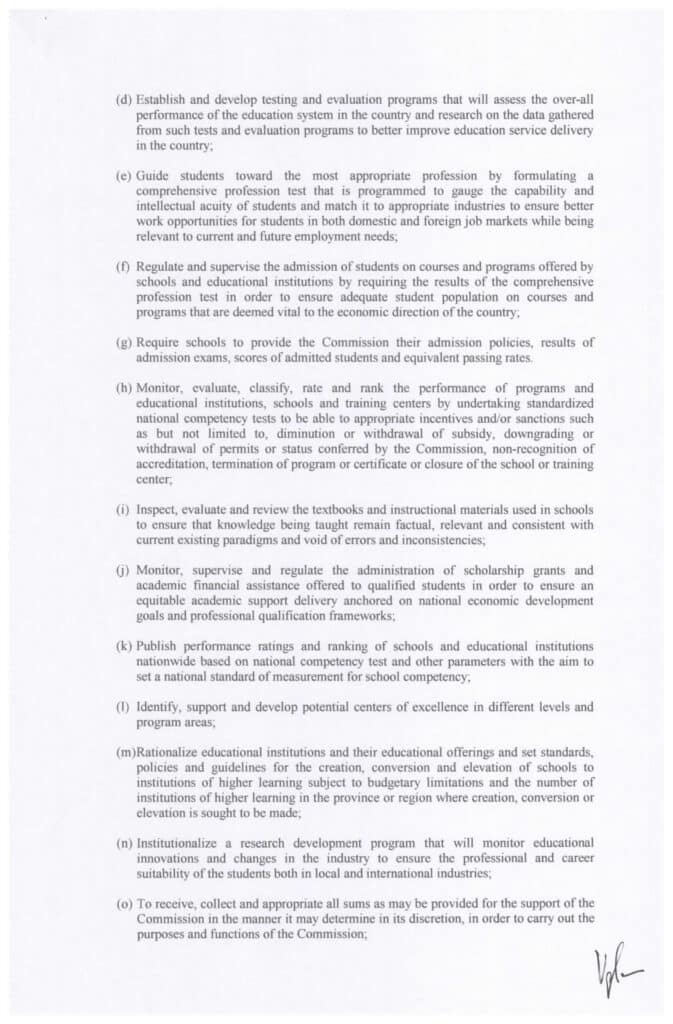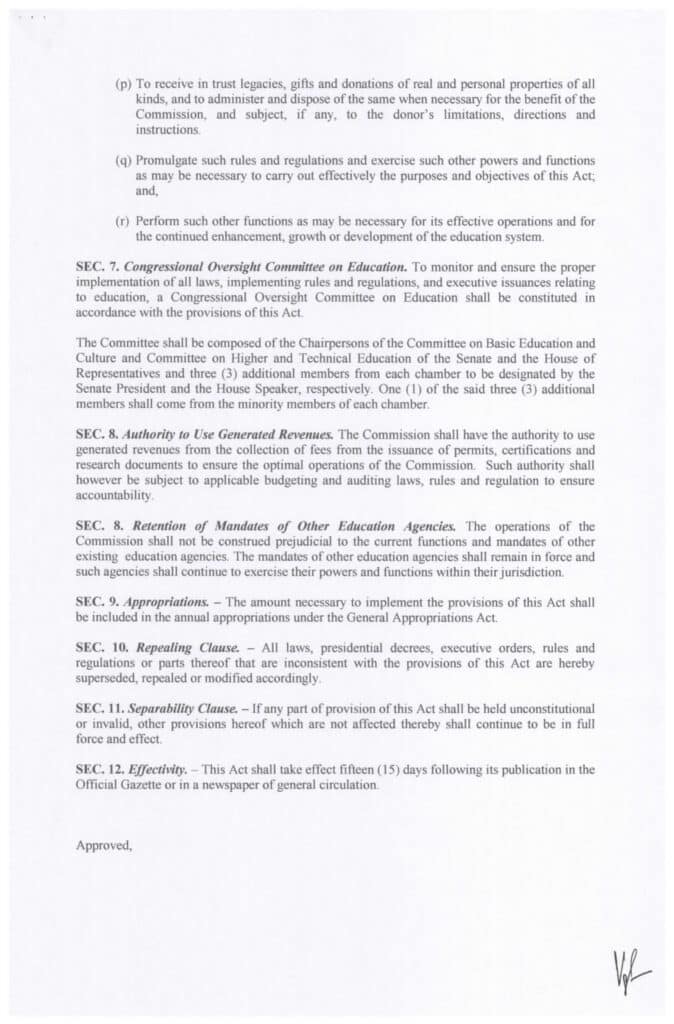Article II, Section 17 of the 1987 Constitution provides:
“The State shall give priority to education, science and technology, arts, culture, and sports to foster patriotism and nationalism, accelerate social progress, and promote total liberation and development. ”
In the same tenor, Article XIV, Section 1 of the Constitution further states:
“The State shall protect and promote the right of all citizens to quality education at all levels and shall take appropriate steps to make such education accessible to all. ”
From these State Principles enshrined in the Constitution, the State recognizes the vital role of quality education in nation-building and development through the creation of a more responsible and literate citizenry. To achieve such ends, the State must ensure and promote quality education for all by ensuring that education policies, strategies and programs in all levels are well-defined and structured in conformity with the national objectives of promulgated qualification frameworks and standards.
However, lapses in governance in the education system of our country persist because of the absence or lack thereof of inter-agency cooperation among key education agencies and offices in streamlining educational policies, guidelines, and standards to ensure the delivery of quality education in all schools at all levels.
This bill aims to bridge the governance and policy-making frameworks of basic education, higher education and technical-vocational education which shall set the general directions for educational policies, quality standards, guidelines and supervision of learning outcomes of the entire education system. By defining the roles and responsibilities of different education agencies and offices, the goals and objectives outlined in the national qualifications framework will be better achieved.
Similarly, the bill also aims to services to develop a comprehensive educational policy based on extensive research on education and industry trends to ensure the professional and career suitability of the students both in local and international professions and seeks to empower further education institutions to be effective partners in the delivery of educational reforms.
Table of Contents
House Bill No. 8638
AN ACT CREATING AN INDEPENDENT POLICY-MAKING, QUALITY ASSESSING, RESEARCH AND REGULATORY BODY FOR THE EDUCATION SYSTEM IN THE PHILIPPINES TO BE KNOWN AS THE PHILIPPINE EDUCATION RESEARCH AND REGULATORY COMMISSION, APPROPRIATING FUNDS THEREFOR AND FOR OTHER PURPOSES
Introduced by Manila Teachers Representative VIRGILIO S. LACSON
Be it enacted by the Senate and the House of Representatives of the Philippines in Congress assembled:
SECTION 1. Short Title.– This Act shall be known as the “Philippine Education Research and Regulatory Commission Act”.
SEC. 2. Declaration of Policy. – The State shall promote the right of all citizens to affordable quality education at all levels and shall take steps to ensure that quality education shall be accessible to all. The State shall promote the continuing intellectual growth and development of students in schools and professionals in industries, the advancement of research and development, and the enrichment of responsible and effective leadership in the academe.
Towards this end, Basic Education, Undergraduate, Graduate, Post-Graduate, Technical and Vocational Institutions shall gear their education programs in conformity with national qualifications framework plans to achieve total human development.
SEC. 3. Purposes and Objectives. – The purposes and objectives of this Act are:
a) To bridge the governance and policy-making frameworks of basic education, higher education and technical-vocational education which shall set the general directions for educational policies, quality standards, guidelines and supervision of learning outcomes of the entire education system;
b) To define the roles and responsibilities of different education agencies and offices at various levels in implementing programs, projects and services to realize the goals and objectives set forth in the national qualifications framework;
c) To empower educational institutions as effective partners in the delivery of educational services at all levels in the attainment of greater access to educational opportunities;
d) To develop a comprehensive educational policy based on extensive research on education and industry trends to ensure the professional and career suitability of the students both in local and international professions;
e) To guide future professionals and skilled workers in choosing appropriate professions in key industries that are vital in nation-building and will further spur economic growth and development;
SEC. 4. Creation of the Philippine Education Research and Regulatory Commission. – The Philippine Education Regulatory Commission, which is created pursuant to this Act and hereinafter referred to as the Commission, shall be vested with authority, accountability and responsibility for ensuring accessibility and improving the delivery of quality basic, collegiate, technical-vocational and higher education.
The Commission shall be headed by a Commissioner with five (5) Deputy Commissioners which shall have jurisdiction on (1) public basic educational schools, (2) private basic educational schools, (3) private higher educational institutions, (4) State Universities and Colleges (SUCs), and (5) technical-vocational schools.
SEC. 5. Philippine Education Advisory Council. – There shall be constituted a Philippine Education Advisory Council which shall meet with the Commission at least once a year to assist the Commission in aligning its policies and plans with the cultural, political and socioeconomic development needs of the country.
The Council shall be composed of the following:
(a) The Commissioner of the Philippine Education Regulatory Commission, as Presiding Officer;
(b) The Director-General of the National Economic Development Authority, as Co-Presiding Officer;
(c) The Secretary of Education;
(d) The Commissioner of Higher Education;
(e) The Director-General of the Technical Education and Skills Development Authority;
(f) The Secretary of Labor and Employment;
(g) The Chief of Philippine National Police;
(h) Two (2) Representatives from College and Universities Accrediting Associations, as members;
(i) One (1) Representative from a recognized Student Organization from Public Educational Institutions, as member; and,
(j) One (1) Representative from a recognized Student Organization from Private Educational Institutions, as member
SEC. 6. Powers and Functions of the Commission. – The Commission shall exercise the following powers and functions:
(a) Formulate develop plans, policies, priorities and programs on the entire educational system;
(b) Set minimum standards for programs/courses of studies at all levels and to approve standards and tests established and conducted by private industries including registrations of educational institutions and certifications;
(c) Set standards for safety and security protocols for all academic institutions to ensure that all-over environment including physical facilities and learning spaces in schools and learning institutions remain conducive for learning and responsive to the safety needs of the academic stakeholders;
(d) Establish and develop testing and evaluation programs that will assess the over-all performance of the education system in the country and research on the data gathered from such tests and evaluation programs to better improve education service delivery in the country;
(e) Guide students toward the most appropriate profession by formulating a comprehensive profession test that is programmed to gauge the capability and intellectual acuity of students and match it to appropriate industries to ensure better work opportunities for students in both domestic and foreign job markets while being relevant to current and future employment needs;
(f) Regulate and supervise the admission of students on courses and programs offered by schools and educational institutions by requiring the results of the comprehensive profession test in order to ensure adequate student population on courses and programs that are deemed vital to the economic direction of the country;
(g) Require schools to provide the Commission their admission policies, results of admission exams, scores of admitted students and equivalent passing rates.
(h) Monitor, evaluate, classify, rate and rank the performance of programs and educational institutions, schools and training centers by undertaking standardized national competency tests to be able to appropriate incentives and/or sanctions such as but not limited to, diminution or withdrawal of subsidy, downgrading or withdrawal of permits or status conferred by the Commission, non-recognition of accreditation, termination of program or certificate or closure of the school or training center;
(i) Inspect, evaluate and review the textbooks and instructional materials used in schools to ensure that knowledge being taught remain factual, relevant and consistent with current existing paradigms and void of errors and inconsistencies;
(j) Monitor, supervise and regulate the administration of scholarship grants and academic financial assistance offered to qualified students in order to ensure an equitable academic support delivery anchored on national economic development goals and professional qualification frameworks;
(k) Publish performance ratings and ranking of schools and educational institutions nationwide based on national competency test and other parameters with the aim to set a national standard of measurement for school competency;
(l) Identify, support and develop potential centers of excellence in different levels and program areas;
(m) Rationalize educational institutions and their educational offerings and set standards, policies and guidelines for the creation, conversion and elevation of schools to institutions of higher learning subject to budgetary limitations and the number of institutions of higher learning in the province or region where creation, conversion or elevation is sought to be made;
(n) Institutionalize a research development program that will monitor educational innovations and changes in the industry to ensure the professional and career suitability of the students both in local and international industries;
(o) To receive, collect and appropriate all sums as may be provided for the support of the Commission in the manner it may determine in its discretion, in order to carry out the purposes and functions of the Commission;
(p) To receive in trust legacies, gifts and donations of real and personal properties of all kinds, and to administer and dispose of the same when necessary for the benefit of the Commission, and subject, if any, to the donor’s limitations, directions and instructions.
(q) Promulgate such rules and regulations and exercise such other powers and functions as may be necessary to carry out effectively the purposes and objectives of this Act; and,
(r) Perform such other functions as may be necessary for its effective operations and for the continued enhancement, growth or development of the education system.
SEC. 7. Congressional Oversight Committee on Education. To monitor and ensure the proper implementation of all laws, implementing rules and regulations, and executive issuances relating to education, a Congressional Oversight Committee on Education shall be constituted in accordance with the provisions of this Act.
The Committee shall be composed of the Chairpersons of the Committee on Basic Education and Culture and Committee on Higher and Technical Education of the Senate and the House of Representatives and three (3) additional members from each chamber to be designated by the Senate President and the House Speaker, respectively. One (1) of the said three (3) additional members shall come from the minority members of each chamber.
SEC. 8. Authority to Use Generated Revenues. The Commission shall have the authority to use generated revenues from the collection of fees from the issuance of permits, certifications and research documents to ensure the optimal operations of the Commission. Such authority shall however be subject to applicable budgeting and auditing laws, rules and regulation to ensure accountability.
SEC. 8. Retention of Mandates of Other Education Agencies. The operations of the Commission shall not be construed prejudicial to the current functions and mandates of other existing education agencies. The mandates of other education agencies shall remain in force and such agencies shall continue to exercise their powers and functions within their jurisdiction.
SEC. 9. Appropriations. – The amount necessary to implement the provisions of this Act shall be included in the annual appropriations under the General Appropriations Act.
SEC. 10. Repealing Clause. – All laws, presidential decrees, executive orders, rules and regulations or parts thereof that are inconsistent with the provisions of this Act are hereby superseded, repealed or modified accordingly.
SEC. 11. Separability Clause. – If any part of provision of this Act shall be held unconstitutional or invalid, other provisions hereof which are not affected thereby shall continue to be in full force and effect.
SEC. 12. Effectivity. – This Act shall take effect fifteen (15) days following its publication in the Official Gazette or in a newspaper of general circulation.
Approved,
HOUSE BILL NO. 8638 OR PHILIPPINE EDUCATION RESEARCH AND REGULATORY COMMISSION HISTORY
FULL TITLE: AN ACT CREATING AN INDEPENDENT POLICY-MAKING, QUALITY ASSESSING, RESEARCH AND REGULATORY BODY FOR THE EDUCATION SYSTEM IN THE PHILIPPINES TO BE KNOWN AS THE PHILIPPINE EDUCATION RESEARCH AND REGULATORY COMMISSION, APPROPRIATING FUNDS THEREFOR AND FOR OTHER PURPOSES
ABSTRACT: Aims to bridge the governance and policy-making frameworks of basic education, higher education and technical-vocational education which shall set the general directions for educational policies, quality standards, guidelines and supervision learning outcomes of the entire education system. Proposes to develop a comprehensive educational policy based on extensive research on education and industry trends to ensure the professional and career suitability of the students both in local and international professions and seeks to further empower educational institutions to be effective partners in the delivery of educational reform
PRINCIPAL AUTHOR/S: LACSON, VIRGILIO S.
DATE FILED: 2018-11-22
SIGNIFICANCE: NATIONAL
ACTIONS TAKEN BY THE COMMITTEE ON RULES:
REFERRAL TO THE COMMITTEE ON BASIC EDUCATION AND CULTURE ON 2018-11-27
SECONDARILY REFERRED TO THE COMMITTEE(S) ON HIGHER AND TECHNICAL EDUCATION



